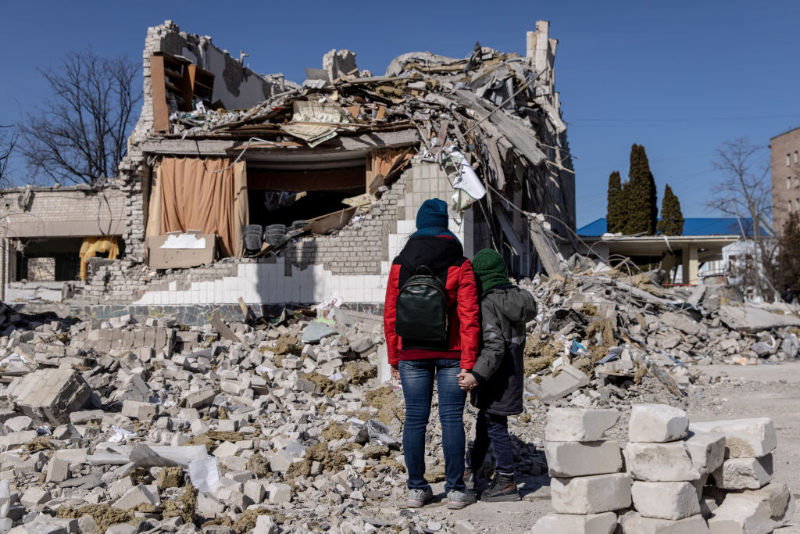Let slip the dogs of war: A tale of futility and bloody-mindedness
- Dorothy Horsfield
- 22 March 2022
In an article published four days before the launch of his country’s invasion of Ukraine, Moscow-based Director of the Russian International Affairs Council (RIAC)Dr Andrei Kortunov warned of its tragic consequences for Russia. The de facto partition of Ukraine, he said, as a result of the Kremlin’s recognition of the independence of the People’s Republics of Donetsk and Luhansk, will signify ‘the final formalisation of he division of Europe’ from which there may be no easy retreat.

Even with the likelihood of a relatively rapid Russian victory on the battlefield, Kortunov was conjuring a darker and more dangerous East/West confrontational future for his homeland. It is an influential narrative that has been widely re-iterated by media spokespeople both within Russian think-tanks such as RIAC and internationally. For Kortunov, it is one to lament: Relations between Russia and the West will be clarified, he wrote, but it will be the crystal clarity of a cold January dawn, when the scorching north wind takes your breath away and squeezes involuntary tears out of your eyes.
I first met Kortunov in 2017, when he travelled to ANU to address a conference on ‘Russia in the wake of the Cold War’ that I had organized. A gentle, humane man and a formidable scholar of international relations, he has a decades-long commitment to post-Soviet integration into a globalized world. This has meant the pursuit of multilateral diplomacy, commentaries on trends in trade and investment and philanthropic engagements with a long list of organizations, including the International Crisis Group, the United Nations Development Program (UNDP), the Organisation for Security and Cooperation in Europe (OSCE) and Oxfam in Africa.
Under his directorship, RIAC also fosters research collaborations and educational exchanges with policy forums such as the Brookings Institution and the Carnegie Endowment for International Peace, as well as with American, British, European and Chinese universities, and with political leaders, not only among his country’s Eurasian neighbours, but globally. A recent Princeton study described the Council as the world’s most influential think-tank on Russian affairs.
Kortunov’s pre-invasion analysis of the impact on Russia and the West of the war in Ukraine has proven to be prescient. The Putin government has become an international pariah, with virtually no allies or, at least sympathetic observers in the West. Even China, with whom it allegedly has close ties, is currently radically reviewing its stance regarding Russia’s belligerence. Confronted with the unified global condemnation of Russia’s actions, a consensus seems to be emerging among Beijing’s policy-makers of the need to distance China from any potential economic and geopolitical impact of what is perceived as an unwinnable war. It is also argued that China may be in a unique position to leverage Putin to stop the war.
'There has been some talk of the need for bringing a mediator to the negotiation table. Both China and India have been suggested as candidates.'
Kortunov’s other predictions add up to a catalogue of human misery, in which Russia is relegated to the role of an isolated rogue state. These include an expanded, very costly and protracted arms race, both nuclear and conventional, in which over time a wealthier and more advantaged Western alliance inevitably would surpass the formidable Russian arsenal; the impoverishment of the economy, not only through draconian sanctions; European countries, the UK and the US already are seeking out alternative sources, for example of hydrocarbons and agricultural imports; and the exclusion of Russian research scientists from participation in the further development of the 4th Industrial Revolution technologies of a world economy already in transition. In other words, the brutality and cruelty of the Russian invasion of Ukraine has been deservedly described as an abomination which will mark the country’s relations with the West for decades to come.
What continues to be an enigma is that, despite his high-profile analyses of his country’s foreign policy challenges, Kortunov’s bleak warnings went unheeded behind the closed doors of Putin’s inner circle. In contrast, anecdotally, it has been repeatedly claimed there was a shared assumption among Russia’s intellectual and business elite that any plan to conquer Ukraine was geostrategic insanity. Among many long-term Russia watchers in the West, it was also assumed that geopolitical commonsense would prevail.
Four weeks into the war it is hard not to share Kortunov’s poetic lament. As the humanitarian catastrophe intensifies and murderous devastation is wrought on cities across Ukraine, diplomatic solutions remain as elusive as ever. At this stage, carrying only a modicum of hope, there has been some talk of the need for bringing a mediator to the negotiation table. Both China and India have been suggested as candidates.
What remains uncertain is how intransigent is Putin’s commitment to his conditions for peace-making. There is the question too of the extent to which America’s long-standing diplomatic obtuseness, warmongering and self-righteousness, of which its dominant role in NATO is emblematic, will undermine any diplomatic attempt to bring to an end the conflict. To paraphrase geopolitical realist Henry Kissinger’s resonate observation, the vilification of Putin and by implication post-Soviet Russia is not a constructive policy. It is the alibi for not having one. Or as Kortunov put it, what is needed now is empathy, flexibility and compromise.
 Dr Dorothy Horsfield is currently a Foundation Fellow at the ANU's Australian Studies Institute. Her most recent book is titled Russia in the Wake of the Cold War Perceptions and Prejudices.
Dr Dorothy Horsfield is currently a Foundation Fellow at the ANU's Australian Studies Institute. Her most recent book is titled Russia in the Wake of the Cold War Perceptions and Prejudices.
Main image: People stand in front of a school hit by a Russian attack in March, 2022 in Zhytomyr, Ukraine. (Chris McGrath / Getty Images)
No comments:
Post a Comment